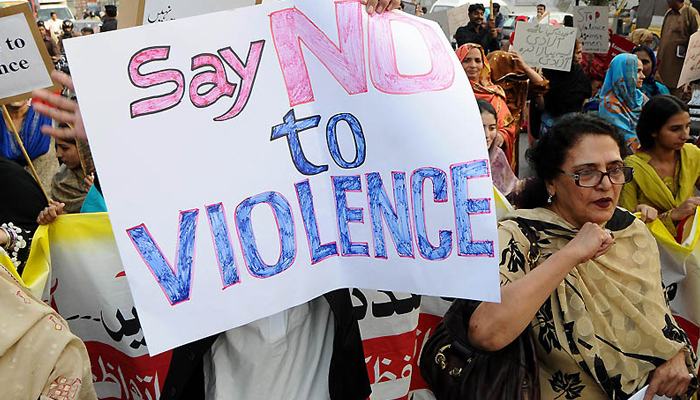Unite against VAW
November 25 marked the International Day for the Elimination of Violence against Women. The day also marks the start of the ‘UNITE campaign’: 16 days of activism against gender-based violence. According to the UN, an estimated one in every three women across the world has been subject to physical and/or sexual intimate partner violence or non-partner sexual violence or both at least once in their lifetime, making violence against women and girls (VAW) one of the most prevalent human rights violations in the world.
One must also reckon with the fact that violence against women is chronically under-reported, with many women who experience violence often not seeking help due to legal, social or cultural constraints. And yet, the behaviour of governments across the world would lead one unacquainted with the facts of gender-based violence to believe that it is not such a big deal after all.
Only 0.2 per cent of government aid is focused on preventing violence against women and girls while 86 per cent of women and girls live in countries that lack legal protections against gender-based violence.
While there are several laws criminalizing violence, harassment and other forms of abuse against women in Pakistan, they have not had the impact in terms of reducing the crimes they seek to prevent that one would desire. Reports reveal that around 40 per cent of Pakistani women have experienced physical or emotional violence in their lifetime, with around 63,000 cases of gender-based violence reported over the last three years alone.
Laws alone can only do so much. If women who experience physical or sexual violence at home or elsewhere fear being ostracized by their family, friends or community for speaking out or somehow being blamed for their situation, cases of gender-based violence will never reach the stage where the law can take action. A first step towards getting the most out of the laws that seek to protect women is to then challenge and change the culture that seeks to disempower women by legitimizing or rationalizing gender-based violence. This is not solely a gender-based violence issue but one of social justice as well, with poorer women less likely to be able to afford the costs that come with filing a case and hiring the legal help needed to prosecute it, highlighting the need to provide legal and financial resources to victims of gender-based violence.
There is also the issue that in cases that are reported and do end up in court, securing justice can be a tall order. According to the UNFPA, the conviction rate for cases that involve violence against women in Pakistan is a shockingly low one to two-and-a-half per cent. It is clear that the legal system needs to change the way it approaches gender-based violence cases in order for women in this country to truly be safe.
-
 Winter Olympics 2026: Lindsey Vonn’s Olympic Comeback Ends In Devastating Downhill Crash
Winter Olympics 2026: Lindsey Vonn’s Olympic Comeback Ends In Devastating Downhill Crash -
 Adrien Brody Opens Up About His Football Fandom Amid '2026 Super Bowl'
Adrien Brody Opens Up About His Football Fandom Amid '2026 Super Bowl' -
 Barbra Streisand's Obsession With Cloning Revealed
Barbra Streisand's Obsession With Cloning Revealed -
 What Did Olivia Colman Tell Her Husband About Her Gender?
What Did Olivia Colman Tell Her Husband About Her Gender? -
 'We Were Deceived': Noam Chomsky's Wife Regrets Epstein Association
'We Were Deceived': Noam Chomsky's Wife Regrets Epstein Association -
 Patriots' WAGs Slam Cardi B Amid Plans For Super Bowl Party: She Is 'attention-seeker'
Patriots' WAGs Slam Cardi B Amid Plans For Super Bowl Party: She Is 'attention-seeker' -
 Martha Stewart On Surviving Rigorous Times Amid Upcoming Memoir Release
Martha Stewart On Surviving Rigorous Times Amid Upcoming Memoir Release -
 Prince Harry Seen As Crucial To Monarchy’s Future Amid Andrew, Fergie Scandal
Prince Harry Seen As Crucial To Monarchy’s Future Amid Andrew, Fergie Scandal -
 Chris Robinson Spills The Beans On His, Kate Hudson's Son's Career Ambitions
Chris Robinson Spills The Beans On His, Kate Hudson's Son's Career Ambitions -
 18-month Old On Life-saving Medication Returned To ICE Detention
18-month Old On Life-saving Medication Returned To ICE Detention -
 Major Hollywood Stars Descend On 2026 Super Bowl's Exclusive Party
Major Hollywood Stars Descend On 2026 Super Bowl's Exclusive Party -
 Cardi B Says THIS About Bad Bunny's Grammy Statement
Cardi B Says THIS About Bad Bunny's Grammy Statement -
 Sarah Ferguson's Silence A 'weakness Or Strategy'
Sarah Ferguson's Silence A 'weakness Or Strategy' -
 Garrett Morris Raves About His '2 Broke Girls' Co-star Jennifer Coolidge
Garrett Morris Raves About His '2 Broke Girls' Co-star Jennifer Coolidge -
 Winter Olympics 2026: When & Where To Watch The Iconic Ice Dance ?
Winter Olympics 2026: When & Where To Watch The Iconic Ice Dance ? -
 Melissa Joan Hart Reflects On Social Challenges As A Child Actor
Melissa Joan Hart Reflects On Social Challenges As A Child Actor




